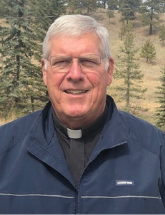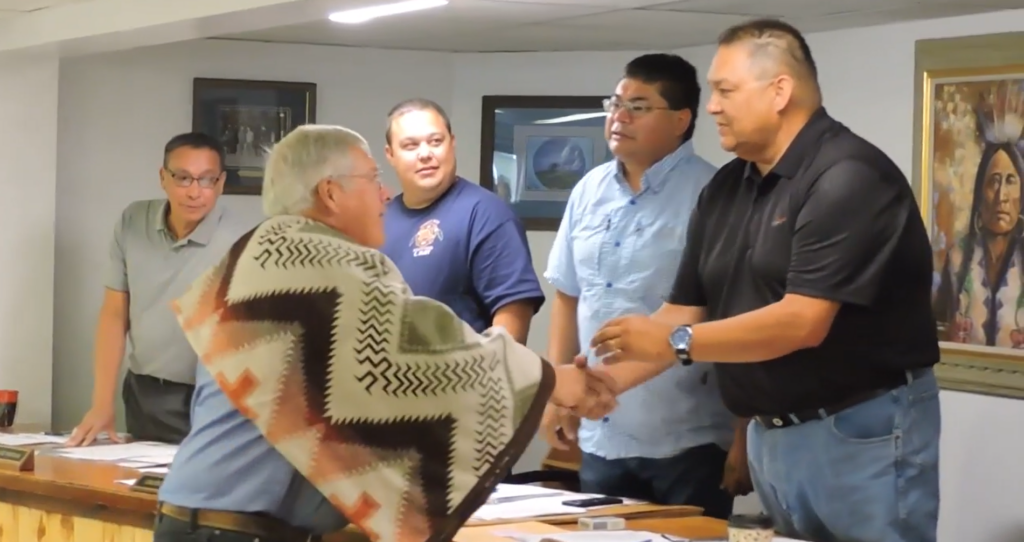Rev. Peter Guthneck is a beloved retired priest of our diocese, as well as a board member of the Catholic Foundation of Eastern Montana.
Father spent decades ministering at three parishes on or near Rocky Boy Indian Reservation, and knows a lot about sustaining rural Catholic communities through endowments.
Father, why did you become a priest? And how did you end up in Montana?

Father Peter Guthneck
It seems like I always had a calling to be a priest. No one else said anything, but I knew. At first, I thought about becoming a Maryknoll priest, but in the 1960s, I was drawn from my home state, Wisconsin, to Montana. In 1965, while I was still a student at Loras College in Iowa, the Christian Family Movement (CFM) invited me to come volunteer at Rocky Boy Indian Reservation, where several CFM families had been invited by Father Raymond Nyquist. And from there I just kept making the decisions that led to my becoming a priest. Support from my family, as well as from other Montana families and Christian Family Movement volunteers, kept me going.
I attended St. Francis Seminary in Milwaukee and then, two years before ordination, asked to transfer to the Diocese of Great Falls-Billings. My last year in seminary was spent partly in Wolf Point with Father Michael Guinan. Once I got to Montana, my first assignment was Poplar, Brockton, and Fort Kipp. Then, from 1977 until my retirement in 2018, I was fortunate to be at Rocky Boy, Box Elder, and Big Sandy. I’m thankful to have worked with religious sisters all these years, both Dominican and Franciscan sisters.

Father Pete’s retirement ceremony with the Chippewa Cree Tribal Council
Do you have a favorite verse from Scripture?
“Do not be afraid…I am with you always, to the end of the age” (Isaiah 41:10; Matthew 28:10,20). These words from Jesus keep me going. For many years, it was like He was saying, “Do not be afraid of becoming a priest, of going where I send you.” These verses give me confidence and courage and peace.
Who are some of your favorite saints? Can you say why?
Saint Peter, of course! I was named after my grandfather and I identify with Saint Peter’s personality. Then there’s St. Anthony of Padua—I often find myself asking him to help me find something to harvest, and St. Hubert to give me a safe and successful hunt! Over the years, they have been very generous. I hunt deer, elk, birds, antelope, whatever I can find—even bison once in a while.
What do you think the Catholic Foundation of Eastern Montana contributes to the Church in our diocese?
The Foundation offers people an opportunity to share what they have for the mission of the Church in our diocese. More particularly, they offer opportunities to build resources for future ministries. The economy fluctuates, and in good times we should put something away for the future—in endowments.
Priests come and go, bishops come and go, but hopefully, wherever Catholics are, there will always be a community coming together to pray, learn, and minister to each other’s needs. I think they need to take care to provide for the future of their community and not be overly dependent on the hierarchy to do it for them. Endowments at the Foundation are a good way to do this.
Also, in the parishes I’ve ministered in, I always had to look outside the parish boundaries to find the resources I needed for ministries and maintenance, many times to other organizations that were generous with what they had received from endowments and collections. The Catholic Foundation of Eastern Montana is a local way for Catholics and parishes to help other nearby parishes that have less.
What do you hope for the future of the Church in our diocese? For the parishes you used to serve (and still do), and for other Catholic causes that matter to you?
I hope that our diocese will seriously invite men and women in our parish communities to develop Christian Catholic leadership. There are many people in our communities with deep faith, who have the gifts of the Holy Spirit and are already doing the spiritual and corporal works of mercy. We need their communities thriving, with good infrastructure, because the people aren’t going anywhere, even though a priest may not always be present (especially in smaller communities).
You have to enable the people of God and listen to them, find out what they need. Rural and reservation communities will be different from parishes in Billings or Great Falls. We need to think outside the box. Who lives there and what are the needs that the Christian community can respond to?
Building endowments for those communities at the Foundation can give them the resources to do what they need to do as their needs become clear in future years.
If you were talking to someone else about supporting endowments at the Foundation, what would you tell them?
I would ask them: do you believe in the future of the Catholic Christian community in Eastern Montana? Would you like to help it along? To provide resources for your community long after you’re gone?
Many people give to national or international organizations, which is a good thing, but I hope they keep in mind that those organizations already have a greater number of donors than we will ever have in our diocese or our parish community. It’s so important to remember that and to give at home—give to support local needs, the local community, especially long-term.
As a retired priest, I would also encourage people to remember that different priests have different health and other needs, and there are endowments that can help provide for us, especially as we grow older, whether that’s through health benefits (which the Caring for Our Priests Endowment assists with), pensions (Priest Retirement Endowment), or other endowments that could help subsidize housing for retired priests (such as the Stites Memorial Residence Endowment for priests in Great Falls). There is a need for priests (which the Seminarian Education Endowment can help meet), and there are different needs for each priest. Endowments don’t just provide today but every year and for all kinds of priests, so it’s important not to be shortsighted.


